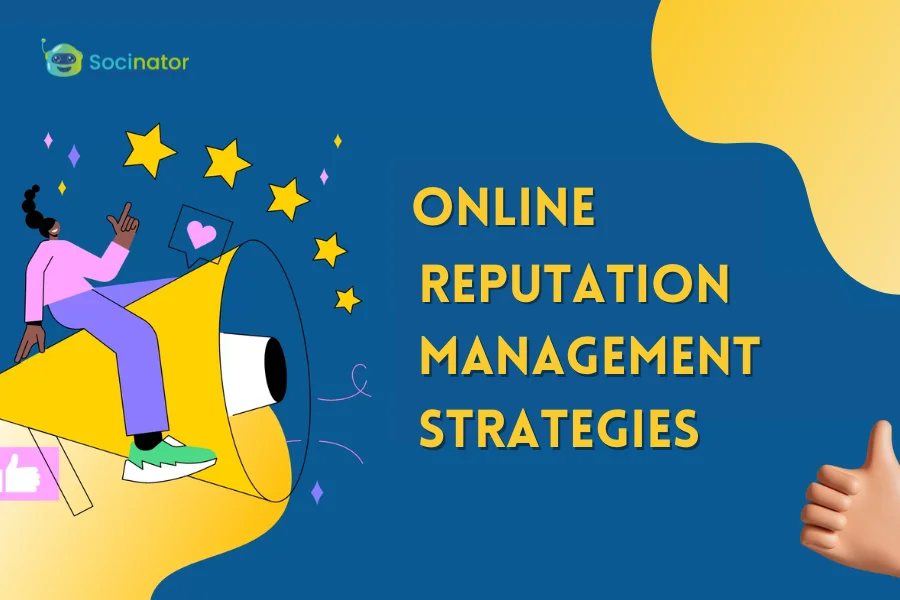Have you ever pondered the significance of your brand’s reputation? Maintaining your brand image demands consistent effort.
Surprisingly, 85% of consumers place as much trust in online reviews as they do in personal recommendations. Unfortunately, some companies overlook the importance of acknowledging and valuing the opinions of their customers and clients. Yet, this aspect is just as pivotal as the sales process itself.
However, without monitoring your reputation actively, it’s a challenge to establish a sustainable business. A single misstep or a contrived comment from competitors can propagate negative information about your company that leads to a loss of trust among existing and potential customers.
Crafting an effective reputation management strategy is achievable through eight essential steps outlined in this blog. But before that, you should know-
Listen To The Podcast Now!
What Is Online Reputation Management?
Online Reputation Management (ORM) refers to a practice that involves monitoring, influencing, and managing how your brand is perceived online. It involves addressing content and proactively building a positive image. ORM encompasses various aspects, including reviews, social media presence, search engine results, and more. Essentially, it’s about controlling the narrative surrounding your brand in the digital realm.
Moreover, it is impossible to prevent individuals from expressing their opinions. The key lies in monitoring these opinions and responding appropriately. Positive opinions can profoundly benefit both your personal and company’s reputation. Conversely, opinions, particularly if unwarranted, can significantly undermine your accomplishments.
Why Reputation Management Is Important for Businesses
The significance of reputation management strategy for businesses cannot be overstated. In today’s digital age, where information is readily accessible, a company’s online reputation directly influences its success. Here’s why it holds immense importance:
Consumer Trust and Credibility
A positive reputation builds trust among consumers. Potential customers often rely on reviews and online information to make purchasing decisions. A strong reputation signals reliability and quality, increasing the likelihood of conversions.
Competitive Edge
A favorable reputation sets you apart from competitors. When faced with similar choices, consumers are more inclined to opt for businesses with a stellar track record and positive reviews.
Brand Image and Loyalty
Maintaining a positive reputation fosters a favorable brand image. It encourages customer loyalty and advocacy, as satisfied customers are more likely to recommend and continue engaging with a trusted brand.
Crisis Management
Having an established reputation management strategy prepares businesses for unforeseen challenges. In the event of negative publicity or crises, a well-maintained reputation can mitigate damage and help in swift recovery.
Influence on Business Growth
A positive social media management strategy directly impacts business growth. It attracts new customers, retains existing ones, and supports revenue generation by enhancing brand visibility and credibility.
Investor Confidence
Investors and stakeholders assess a company’s reputation when making investment decisions. A positive reputation instills confidence in stakeholders, potentially attracting more investment and opportunities.
How to Create a Successful Reputation Management Strategy
Most impactful discussions regarding your brand unfold on the internet. It is crucial to channel a significant portion of your efforts into monitoring these conversations, assessing their impact, and attempting to influence perceptions. Familiarizing yourself with diverse reputation management strategies is essential for selecting the most suitable approach for your organization.
Analyzing a successful reputation management strategy can serve as a valuable guide in developing your strategy. Here are some effective ideas:
Utilize Public Relations
Public relations (PR) is a potent strategy for cultivating a positive image and enhancing brand visibility. A robust PR campaign can initiate the rehabilitation of reputation or catapult an obscure brand into the spotlight. If contemplating a PR initiative as part of your reputation management strategy, consulting with an industry professional is advisable.
Formulate a Content Marketing Strategy
A well-crafted content marketing strategy is an excellent means to position your company as a credible authority in relevant industry subjects. Building trust with your audience significantly influences your brand’s reputation. When devising a marketing strategy, consider the following:
- Establish an authentic, sustainable brand image and reputation.
- Define your target audience and competitive advantages.
- Shape the narrative through high-quality content creation.
- Ensure all messaging aligns with a clear mission and vision.
- Solicit feedback regularly and offer solutions.
- Vigilantly monitor for reputation issues, addressing online concerns promptly and professionally.
Get Active Social Media
Maintaining a strong and engaging social media presence is essential to implement the reputation management strategy. Regularly share valuable content that resonates with your target audience, showcasing your brand’s personality and values. Actively interact with your audience by responding to comments, messages, and mentions.
Consider using social media automation tools like Socinator to schedule posts, ensuring a consistent and strategic approach. These tools can also help you curate content, stay organized, and analyze performance metrics to refine your social media strategy over time. It is a versatile social media management tool designed to assist businesses in maintaining a robust online presence across various social media platforms.
With Socinator, businesses can efficiently manage multiple social accounts simultaneously, saving time and effort. Its functionality includes content scheduling, audience targeting, analytics tracking, and automated responses, empowering businesses to maintain a consistent and engaging presence on platforms like Facebook, Instagram, Twitter, LinkedIn, and more.
Respond Promptly and Professionally
Responding promptly and professionally to customer feedback is a cornerstone of an effective reputation management strategy. Whether the feedback is positive or negative, acknowledging it promptly demonstrates that you value and appreciate customer input. Craft personalized responses to positive reviews, expressing gratitude and reinforcing a positive connection with satisfied customers.
For negative feedback, respond publicly to show accountability, apologize for any inconvenience, and offer a resolution. Encourage the customer to continue the conversation privately to address specific concerns, demonstrating a commitment to resolving issues away from the public eye.
Encourage Positive Reviews
Actively seeking positive reviews is a proactive approach to shaping your online reputation. Implementing social media management strategies like email campaigns targeted at satisfied customers can encourage them to share their positive experiences. Consider offering incentives, such as discounts or exclusive access, as a token of appreciation for their time and feedback.
However, it’s crucial to maintain authenticity and avoid soliciting fake reviews, as they can damage your credibility and erode trust. Genuine, positive reviews from satisfied customers carry more weight and contribute to building a trustworthy online image.
Focus on SEO
Search Engine Optimization (SEO) plays a pivotal role in shaping the online narrative around your brand. Optimize your website and content to ensure positive search engine results when users look for information about your business. Publish high-quality, relevant content that reflects your brand positively.
Use keywords strategically, incorporating them into your website copy, blog posts, and other online content. By improving your online visibility through SEO, you can push negative search results down the page, making it less likely for users to come across unfavorable information.
Read More:
How To Improve Your Customer Sentiment Analysis For Better Business?
The Top 06 Most Useful Socinator Features for a Powerful Social Media Presence
Why Tools for Social Media Management
Understanding Social Media Management Platform
Build Brand Advocacy
Cultivating relationships with influencers and brand advocates can significantly enhance your reputation. Identify individuals or groups that align with your brand values and have a substantial following. Collaborate with them to amplify positive sentiment, leveraging their influence to reach a wider audience.
Encourage social media advocacy by motivating users to share content, testimonials, or positive experiences related to your brand. This not only reinforces your brand’s credibility but also extends your reach organically. Building a network of brand advocates creates a ripple effect, as positive recommendations from trusted sources carry substantial weight in shaping public perception.
Continuously Adapt and Improve
Online reputation management strategy is a dynamic and ongoing process that requires continuous adaptation. Regularly evaluate the effectiveness of your strategies, analyzing feedback and performance metrics. Stay attuned to change trends in your industry and monitor shifts in customer preferences.
Be proactive in addressing emerging issues and adjusting your approach to align with evolving expectations. By remaining agile and responsive, you can manage your online reputation effectively and your brand as one that listens, learns, and consistently strives for improvement.
Final Thoughts
A business’s reputation is no longer confined to word-of-mouth; it’s now a culmination of online interactions and perceptions. Investing in a robust online reputation management strategy is not just a choice but a necessity for businesses aiming for sustained success.
By actively monitoring, engaging with your audience, and implementing these strategies, you can build and maintain a positive online reputation that strengthens your brand into trust among your customers. Remember, a strong online reputation is an invaluable asset that can propel your business toward long-term success.










